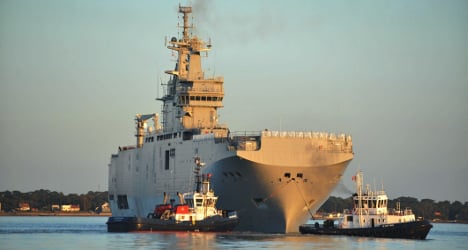"We have regularly and consistently expressed our concerns about this sale even before we had the latest Russian actions and we will continue to do so," Assistant Secretary for Europe Victoria Nuland told US lawmakers ahead of a visit next week to Washington by French Foreign Minister Laurent Fabius.
The first of two Mistral warships is not due to be delivered to Russia until later this year, and France has so far resisted pressure to suspend the controversial $1.2 billion contract.
The Mistral is an advanced helicopter assault ship and France's 2011 agreement to sell them to Russia already triggered protests from the United States and other NATO allies.
The first, named the Vladivostok, is due to be delivered in October, while the second, "The Sebastopol" is to be delivered in 2015 and stationed with the Russian Black Sea Fleet in the Crimea – annexed by Moscow in March.
Lawmakers also pushed for France to halt the sale, saying it would be a clear sign of global anger at what they said was the "aggression" of Russian President Vladimir Putin toward Ukraine.
'Not here to bash the French'
"If we increase NATO defense spending while joining in a coordinated embargo on all arms sales to Russia, including halting the sale of two French-built Mistral amphibious ships, it will send a clear message to Putin that he will not be allowed to trample on the rights of his neighbors," Congressman Eliot Engel, a Democrat, told the House Foreign Affairs committee.
"I'm not here to bash the French, but I think this is a time when the French could stop that sale from happening and send a very strong message to the Russians," added Republican lawmaker Adam Kinzinger.
But French officials reacted with astonishment, denying that US officials had expressed worries over the contract.
"The United States, like the Europeans, have never voiced privately any concerns about this," a French government official told AFP, asking not to be identified.
"And we are anyway used to such thundering declarations from her (Nuland). She's a neo-con. And the fact that it comes from her is actually reassuring."
Fabius is still likely to come under pressure from US officials during his visit to the US capital next week, although he did say in late March that Paris may cancel the Mistral sale if Moscow does not change its policies towards Kiev.
French Defense Minister Jean-Yves Le Drian, however, said that month "the question" of whether to suspend the sale "will arise in October" and that any decision was postponed until then.
Sanctions 'scalpel not hammer'
The United States and its European Union allies are mulling whether to impose deeper sectoral sanctions on Moscow for its annexation of Ukraine's southern Crimea peninsula and its interference in eastern Ukraine.
They would include sanctions against its key banking, energy and mining sectors.
"The idea here is… to use the scalpel rather than a hammer to focus primarily on high tech and other investment where Russia needs us far more than we need Russia," Nuland said.
"The approach would also involve taking a sectoral slice across a bunch of different sectors at the same time such that the pain is shared among sectors of the economy and to help keep Europeans together because different ones are vulnerable in different sectors."
She reminded lawmakers that European nations had closer economic ties with Russia than the United States "so they are far more vulnerable."
"Whereas Europe trades nine percent with Russia, Russia's trade is 50 percent based in Europe," Nuland told the committee.



 Please whitelist us to continue reading.
Please whitelist us to continue reading.
Member comments